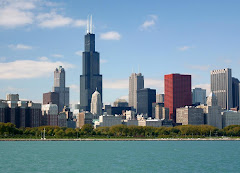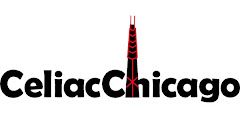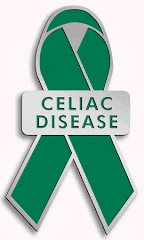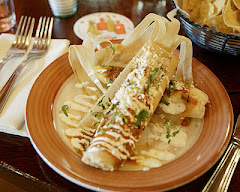Celiac Friendly Grocery Stores in the Chicago Area
The hardest part about buying gluten -free food is the price. Yes, I buy Whole Food's Gluten-Free Prairie Bread for $6.99/loaf! Please be prepared to have your grocery bill increase! Some of my favorite brands are Enjoy Life, Pamela's, Lundberg and Tinkyada and Pizza by George.
Below is a list of grocery stores are in the Chicago, IL area from the CSAGC. You can also find a lot of gluten-free food online by googling "Gluten Free Food". Another source for brand names and shopping is from the website of the Celiac Disease Foundation http://www.celiac.org/lifestyle/downloads/SUGGESTED-SOURCES-2_07.pdf This list is provided as a convenience to newly diagnosed celiacs in finding a place to purchase gluten-free products, and does not imply endorsement of any business by any celiac disease organization or group.
Even though a manufacturer or a store may label a product as 'gluten-free' only you can make the decision to include it in your diet. Continue to read labels, and to ask questions politely, of course! Call first to make sure the store is still in business.
A Way of Life 9359 N. Milwaukee Ave (In Millbrook Shopping Center) Niles, IL 60714 Phone: 847-966-5565
Always Healthy 123 S. Rand Road Lake Zurich, IL 60047 Phone: 847-438-9200
American Health Foods 5142 W. 95th St Oak Lawn, IL 60453 Phone: 708-423-5099
Corner Health Food Store 502 N. Seymour Ave. Mundelein, IL 60060 Phone: 847-566-4888
Countryside 1166 S. Elmhurst Rd Mount Prospect, IL Phone: 847-952-4372
Crystal Lake Health Food Store 25 E. Crystal Lake Ave Crystal Lake, IL 60014 Phone: 847-459-7942
Dominicks, Jewel and Meijer Numerous locations throughout the city and suburbs.
Major supermarket chain. Bring your gluten-free product guide with you.
Earthly Goods Health Foods Inc. 6951 W. Grand Ave New strip mall just west of Gurnee Mills w/Linens 'N Things and Old Navy) Gurnee, IL 60031 Phone: 847-855-9677
Eurofresh Market 130 NW Hwy Palatine, IL 60067 Phone: 847-202-0333
Gluten-Free Store 807 Waukegan Rd Corner of Dundee and Waukegan Roads Northbrook, IL 60062 Phone: 847-513-6515
Formerly known as "Gluten Free Market" in Buffalo Grove.
Fruitful Yield 2129 W. 63rd Street, Downers Grove 60516 630-969-7614 229 W. Roosevelt Rd, Lombard 60148 630-629-9242 154 S. Bloomingdale Rd, Bloomingdale 60108 630-894-3553 175 W. Golf Road, Schaumburg 60195 847-882-2999 214 N. York Rd, Elmhurst IL60126 630-530-1445 302S. McLean Blvd., Elgin IL 60123 847-888-0100 and Aurora near Fox Valley Mall 630-585-9200
Gluten-Free Trading Company 3116 S. Chase Ave. Milwaukee, WI 53207 Phone: 414-747-8700 FAX: 414-474-8747 . It is suggested that you call ahead to verify hours.
Hilke's Nutrition Center 1691 Morthland Dr. Valparaiso, IN 46385 Phone: 219-477-4005 2917 Calumet Ave, Valparaiso IN 46383 Phone: 219-464-7818
Mitsuwa Marketplace 100 E. Algonquin Rd Arlington Hts., IL 60005 Phone: 847-956-6699
Oriental (predominantly Japanese) supermarket. Lone Star Natural Foods 311 N. 2nd Street St. Charles IL 60174 Phone: 630-584-7650
Natural Choices 1338 N Cedar Road New Lenox, IL 60451 Phone: 815-485-5572
Has a good selection of gluten-free products. Pricey.
New Vitality Health Foods 9177 West 151st Street Orland Park, IL 60462 Phone: 708-403-0120 Fax: 708-403-7041
Orland Meat Market & Deli 9105 W. 151st Street Orland Park, IL 60462 Phone: 708-403-0900 Carries Gluten Free Deli Lunch Meat- The brand name is Boar's Head.
Pass' Health Foods 7228 W. College Dr. (119th St) Palos Heights, IL 60463 Phone: 708-448-9114
Southtown Health Foods 2100 W. 95th Street (NW corner of 95th & Hoyne) Chicago, Il Phone: 773-233-1856
Sunrise Farm Market 17650 Torrence Avenue Lansing, IL 60438 Phone: 708-474-6166
Sunset Foods 1127 Church Street Northbrook, IL 60062 Phone: 847-272-7700
Trader Joe’s Various Locations around the country http://www.traderjoes.com/
Good Waffles and pancakes!
Valli Produce 400 E. Golf Road (two blocks east of Arlington Heights Rd.) Phone: 847-439-9700 850 N. Roselle Road (SW corner of Roselle and Higgins) Phone: 847-252-7200
Whole Foods Market Whole Foods Market Location Search
Supermarket specializing in health foods and organic produce. Selection varies from store to store. All stores carry a variety of specifically gluten-free foods e.g. breakfast cereal, cookies, flours and mixes, pasta, and frozen breads and waffles. They also carry gluten-free brands of many other products.
Wild Oats Market 1111 Chicago Ave., Evanston, Illinois, 60202 Hours: Monday-Sunday 8a.m.-10p.m. Phone: 847-475-9492, 500 E. Ogden Ave. , Hinsdale, Illinois, 60521 Hours: Monday-Friday 7am-10pm, Saturday 7am-9pm, Sunday 7am-8pm Phone: 630-986-8500 They carry gluten-free breads, cereals, organic foods, and meats http://www.wildoats.com/

Friday, September 28, 2007
Restaurants and Eating Out
Eating out will always be difficult for people living with celiac disease. My goal is to provide factual information that will allow people to make informed decisions on local restaurants that are or attempt to be gluten-free.
Cross contamination in the kitchen can occur when eating out. You need to be VERY careful. You can still have eaten gluten and may not have any outward reaction, so please be careful.
The information shared on this website will have come from myself and other fellow Celiac's experiences.
Eat out if you must, but always call ahead and talk to a manger and explain that you have celiac disease and cannot consume any gluten whatsoever! Remind your waitstaff of your condition and express your concerns about cross contamination in the kitchen etc. You will be able to tell by your conversation whether or not the restaurant can accomidate your needs. Trust your instincts and if you get a bad feeling, leave.
These reviews are based on my own personal experiences:
I give the following restaurants an A+ for knowledge of the disease, a gluten-free menu with variety, and great tasting food: Daluciano's.
I have dined at PF Changs in Chicago last year for the annual University of Chicago Celiac Disease Fundraiser and I have also visited the Orland Park restaurant. I highly recommend the GF lettuce wraps. I give them an A-/B+.
Ted Montana's Grill in Bolingbrook gets a grade of B. They did have a gluten-free menu, but it was missing and someone had to search for it. The menu choices were limited, but the waiter was very attentive and even asked me if I wanted the chef to come out to talk to me.
Red Robin offers a bunless burger and gluten - free fries. I have eaten at several, but the service varies. They never have a gluten free menu available! Download your own from the internet. The menu is limited so they get a C-/D+.
I have never had a good experience at the Naperville Outback Steakhouse . I have gotten sick twice! I'm not sure about the others in IL, but I will not dine there again. The servers did not have a clue about what the word gluten meant, even though I was assured by the manager before I walked in the door that I would be taken care of and that I shouldn't worry. They also did not have a GF menu ready when I arrived, even though I requested that it be there upon my arrival. I give them an D-/ at least they attempt to be gluten-free.
I have not tried Adobo, Biaggi's or Vinci's yet. Fellow Celiac's that I trust have all had a positive experience.
I know there are many more restaurants in the Chicagoland area that I have yet to try. I will find you! Beware- I am very truthful and will always come as a secret diner. ~Lori
Cross contamination in the kitchen can occur when eating out. You need to be VERY careful. You can still have eaten gluten and may not have any outward reaction, so please be careful.
The information shared on this website will have come from myself and other fellow Celiac's experiences.
Eat out if you must, but always call ahead and talk to a manger and explain that you have celiac disease and cannot consume any gluten whatsoever! Remind your waitstaff of your condition and express your concerns about cross contamination in the kitchen etc. You will be able to tell by your conversation whether or not the restaurant can accomidate your needs. Trust your instincts and if you get a bad feeling, leave.
These reviews are based on my own personal experiences:
I give the following restaurants an A+ for knowledge of the disease, a gluten-free menu with variety, and great tasting food: Daluciano's.
I have dined at PF Changs in Chicago last year for the annual University of Chicago Celiac Disease Fundraiser and I have also visited the Orland Park restaurant. I highly recommend the GF lettuce wraps. I give them an A-/B+.
Ted Montana's Grill in Bolingbrook gets a grade of B. They did have a gluten-free menu, but it was missing and someone had to search for it. The menu choices were limited, but the waiter was very attentive and even asked me if I wanted the chef to come out to talk to me.
Red Robin offers a bunless burger and gluten - free fries. I have eaten at several, but the service varies. They never have a gluten free menu available! Download your own from the internet. The menu is limited so they get a C-/D+.
I have never had a good experience at the Naperville Outback Steakhouse . I have gotten sick twice! I'm not sure about the others in IL, but I will not dine there again. The servers did not have a clue about what the word gluten meant, even though I was assured by the manager before I walked in the door that I would be taken care of and that I shouldn't worry. They also did not have a GF menu ready when I arrived, even though I requested that it be there upon my arrival. I give them an D-/ at least they attempt to be gluten-free.
I have not tried Adobo, Biaggi's or Vinci's yet. Fellow Celiac's that I trust have all had a positive experience.
I know there are many more restaurants in the Chicagoland area that I have yet to try. I will find you! Beware- I am very truthful and will always come as a secret diner. ~Lori
Saturday, September 8, 2007
Introduction to Celiac Disease
What is celiac disease?
Celiac disease is an autoimmune digestive disease that damages the villi of the small intestine and interferes with absorption of nutrients from food. To put it simply, the body is attacking itself! It is NOT an allergy to wheat!
Celiac disease is triggered by consumption of the protein called gluten, which is found in wheat, barley, rye and other grains like spelt, triticale and kamut.
When people with celiac disease eat foods containing gluten, their immune system responds by damaging the fingerlike villi of the small intestine. When the villi become damaged, the body is unable to absorb nutrients into the bloodstream, which can lead to malnourishment.
Celiac disease is also known as celiac sprue, nontropical sprue, and gluten-sensitive enteropathy.
Researchers have determined that celiac disease is a genetic condition, meaning that it is inherited. In some cases, celiac becomes active or is triggered by events such as surgery, pregnancy, childbirth, viral infection, or severe emotional stress.
Roughly one out of every 133 Americans has celiac disease, but 97% remain undiagnosed. This means that almost three million Americans have celiac disease and only about 100,000 know they have it.
Left untreated, people with celiac disease can develop further complications such as other autoimmune diseases, osteoporosis, thyroid disease, and cancer.
There are a number of medical problems that are associated with undiagnosed celiac disease including cancer, osteoporosis, diabetes Type 1, thyroid problems and reproductive health issues.
What are the symptoms?
The symptoms of celiac disease vary amongst different people. Some patients develop symptoms as early in life, while others feel healthy far into adulthood.
Symptoms of celiac disease may or may not occur in the digestive system. For example, one person might have diarrhea and abdominal pain, while another person has irritability or depression. In fact, irritability is one of the most common symptoms in children.
Some of the most common symptoms of celiac disease include:
Bloating or Gas
Diarrhea
Constipation
Fatigue
Itchy Skin Rash
Tingling/Numbness
Pale Mouth Sores
Joint Pain
Delayed Growth
Poor Weight Gain
Thin Bones
Infertility
Headaches
Depression
Irritability
Discolored Teeth
Anemia, delayed growth, and weight loss are signs of malnutrition. Malnutrition is a serious problem for anyone, but particularly for children because they need adequate nutrition to develop properly. Failure to thrive during childhood development is a common indicator of celiac disease.
Some people with celiac disease may not have symptoms or what is called asymptomatic. The undamaged part of their small intestine is able to absorb enough nutrients to prevent symptoms. However, people without symptoms are still at risk for the complications of celiac disease.
How is celiac disease diagnosed?
Accurately diagnosing celiac disease can be quite difficult largely because the symptoms often mimic those of other diseases including irritable bowel syndrome, Chron's's disease, ulcerative colitis, diverticulosis, intestinal infections, chronic fatigue syndrome, and depression.
To gain a proper diagnosis of celiac disease, a physician will order the following blood tests:
Total IgA
IgA antitissue transglutaminase (tTG)
IgA antiendomysial antibody immunofluorescence (EMA) (It is important to continue eating a normal, gluten-containing diet before being tested for celiac.)
If the blood tests and symptoms indicate celiac, a physician may suggest a biopsy of the lining of the small intestine to confirm the diagnosis.
What is the treatment?
The only treatment for celiac disease is a lifelong gluten-free diet. A gluten-free diet means avoiding all foods that contain wheat (including spelt, triticale, and kamut), rye, and barley.
Despite these restrictions, people with celiac disease can eat a well-balanced diet with a variety of foods, including bread and pasta. For example, instead of wheat flour, people can use potato, rice, soy, or bean flour. Or, they can buy gluten-free bread, pasta, and other products from specialty food companies.
Safe gluten-free cooking substitutes:
Brown Rice Flour
Guar Gum
Potato Starch
Buckwheat
Quinoa
Aramanth
Almond Flour
Teff
Corn Flour
Tapioca Starch
Soy Flour
Xanthum Gum
Corn Starch
Potato Flour
Sweet Rice Flour
Lentil
The gluten-free diet is a lifetime requirement for people with celiac disease. Eating any gluten, no matter how small an amount, can damage the intestine. This is true for anyone with the disease, including people who do not have noticeable symptoms. DO NOT CHEAT!
Following a gluten-free diet may seem difficult at first, but, with a little creativity, anyone can make delicious gluten-free meals!
For example, plain meat, fish, rice, fruits, and vegetables do not contain gluten, so people with celiac disease can eat as much of these foods as they like. Places in the Chicagoland area that have the largest gluten free selections are Whole-Foods, Fruitful Yield, and Wild Oats. Other places, such as Meijer and Jewel have a small selection of gluten-free foods, but are getting bigger everyday. There are smaller stores in the Chicagoland area, but I haven't visisted them yet. There are also many online stores-just google gluten free foods.
Support groups are particularly helpful for newly diagnosed people and their families as they learn to adjust to a new way of life. I attend the Gluten Free Wikaduke group down in Plainfield, IL. See others in the Chicagoland area listed on the blog.
What Are The Complications of Celiac Disease?
Damage to the small intestine and the resulting problems with nutrient absorption put a person with celiac disease at risk for several diseases and health problems:
Celiac disease is an autoimmune digestive disease that damages the villi of the small intestine and interferes with absorption of nutrients from food. To put it simply, the body is attacking itself! It is NOT an allergy to wheat!
Celiac disease is triggered by consumption of the protein called gluten, which is found in wheat, barley, rye and other grains like spelt, triticale and kamut.
When people with celiac disease eat foods containing gluten, their immune system responds by damaging the fingerlike villi of the small intestine. When the villi become damaged, the body is unable to absorb nutrients into the bloodstream, which can lead to malnourishment.
Celiac disease is also known as celiac sprue, nontropical sprue, and gluten-sensitive enteropathy.
Researchers have determined that celiac disease is a genetic condition, meaning that it is inherited. In some cases, celiac becomes active or is triggered by events such as surgery, pregnancy, childbirth, viral infection, or severe emotional stress.
Roughly one out of every 133 Americans has celiac disease, but 97% remain undiagnosed. This means that almost three million Americans have celiac disease and only about 100,000 know they have it.
Left untreated, people with celiac disease can develop further complications such as other autoimmune diseases, osteoporosis, thyroid disease, and cancer.
There are a number of medical problems that are associated with undiagnosed celiac disease including cancer, osteoporosis, diabetes Type 1, thyroid problems and reproductive health issues.
What are the symptoms?
The symptoms of celiac disease vary amongst different people. Some patients develop symptoms as early in life, while others feel healthy far into adulthood.
Symptoms of celiac disease may or may not occur in the digestive system. For example, one person might have diarrhea and abdominal pain, while another person has irritability or depression. In fact, irritability is one of the most common symptoms in children.
Some of the most common symptoms of celiac disease include:
Bloating or Gas
Diarrhea
Constipation
Fatigue
Itchy Skin Rash
Tingling/Numbness
Pale Mouth Sores
Joint Pain
Delayed Growth
Poor Weight Gain
Thin Bones
Infertility
Headaches
Depression
Irritability
Discolored Teeth
Anemia, delayed growth, and weight loss are signs of malnutrition. Malnutrition is a serious problem for anyone, but particularly for children because they need adequate nutrition to develop properly. Failure to thrive during childhood development is a common indicator of celiac disease.
Some people with celiac disease may not have symptoms or what is called asymptomatic. The undamaged part of their small intestine is able to absorb enough nutrients to prevent symptoms. However, people without symptoms are still at risk for the complications of celiac disease.
How is celiac disease diagnosed?
Accurately diagnosing celiac disease can be quite difficult largely because the symptoms often mimic those of other diseases including irritable bowel syndrome, Chron's's disease, ulcerative colitis, diverticulosis, intestinal infections, chronic fatigue syndrome, and depression.
To gain a proper diagnosis of celiac disease, a physician will order the following blood tests:
Total IgA
IgA antitissue transglutaminase (tTG)
IgA antiendomysial antibody immunofluorescence (EMA) (It is important to continue eating a normal, gluten-containing diet before being tested for celiac.)
If the blood tests and symptoms indicate celiac, a physician may suggest a biopsy of the lining of the small intestine to confirm the diagnosis.
What is the treatment?
The only treatment for celiac disease is a lifelong gluten-free diet. A gluten-free diet means avoiding all foods that contain wheat (including spelt, triticale, and kamut), rye, and barley.
Despite these restrictions, people with celiac disease can eat a well-balanced diet with a variety of foods, including bread and pasta. For example, instead of wheat flour, people can use potato, rice, soy, or bean flour. Or, they can buy gluten-free bread, pasta, and other products from specialty food companies.
Safe gluten-free cooking substitutes:
Brown Rice Flour
Guar Gum
Potato Starch
Buckwheat
Quinoa
Aramanth
Almond Flour
Teff
Corn Flour
Tapioca Starch
Soy Flour
Xanthum Gum
Corn Starch
Potato Flour
Sweet Rice Flour
Lentil
The gluten-free diet is a lifetime requirement for people with celiac disease. Eating any gluten, no matter how small an amount, can damage the intestine. This is true for anyone with the disease, including people who do not have noticeable symptoms. DO NOT CHEAT!
Following a gluten-free diet may seem difficult at first, but, with a little creativity, anyone can make delicious gluten-free meals!
For example, plain meat, fish, rice, fruits, and vegetables do not contain gluten, so people with celiac disease can eat as much of these foods as they like. Places in the Chicagoland area that have the largest gluten free selections are Whole-Foods, Fruitful Yield, and Wild Oats. Other places, such as Meijer and Jewel have a small selection of gluten-free foods, but are getting bigger everyday. There are smaller stores in the Chicagoland area, but I haven't visisted them yet. There are also many online stores-just google gluten free foods.
Support groups are particularly helpful for newly diagnosed people and their families as they learn to adjust to a new way of life. I attend the Gluten Free Wikaduke group down in Plainfield, IL. See others in the Chicagoland area listed on the blog.
What Are The Complications of Celiac Disease?
Damage to the small intestine and the resulting problems with nutrient absorption put a person with celiac disease at risk for several diseases and health problems:
Lymphoma and adenocarcinoma are types of cancer that can develop in the intestine.
Osteoporosis is a condition in which the bones become weak, brittle, and prone to breaking. Poor calcium absorption is a contributing factor to osteoporosis.
Miscarriage and congenital malformation of the baby, such as neural tube defects, are risks for untreated pregnant women with celiac disease because of malabsorption of nutrients.
Short stature results when childhood celiac disease prevents nutrient absorption during the years when nutrition is critical to a child's normal growth and development. Children who are diagnosed and treated before their growth stops may have a catch-up period.
Seizures, or convulsions, result from inadequate absorption of folic acid. Lack of folic acid causes calcium deposits, called calcifications, to form in the brain, which in turn cause seizures.
My Story
My name is Lori and I have celiac sprue or celiac disease. I received the official diagnosis on January 5, 2007. Thank you Dr. Ali!
My journey began in 2001 when I was having a difficult time becoming pregnant. I thought it was because it was related to my age (I’m an older gal), but now I know differently. Infertility and miscarriages are related to untreated celiac disease. I was told that I would miscarry at week 5. And by week 8 things did not look good. But by week 11, everything seemed to be okay….At 36 weeks, I delivered my first and only child, a healthy baby boy.
I almost died after his birth. I started to hemorrhage. My placenta would not detach from my uterus and I lost over 40% of my blood. In order to save my life, the doctors needed to give me a life saving hysterectomy and blood transfusion. I was later told I had placenta accreta-( the doctors didn’t know this before I delivered). In retrospect, I believe this incidence was related to having undiagnosed/untreated celiac disease.
It took almost 4 1/2 years to get my celiac diagnosis. I was told by doctors I was depressed and they all wanted to give me antidepressants to feel better. I knew it was much more than that, so after going to two endocrinologists, a chiropractor, and long conversations with my OB/GYN, nobody seemed to know what was wrong with me.
Thank goodness for a weekend of overindulgences of gluten packed food - pizza and beer! I ended up in the emergency room with deliberating pain on my lower left side. I was given a CAT scan and some pain medication and was told to go home and make an appointment with a gastrointestinal doctor. That is how I met Dr. Ali (Edward Hospital in Naperville). He is probably the most caring and compassionate doctor I have ever met. As soon as I sat down in his office and told him my symptoms, he said that he was going to test me for celiac sprue. I said, “Celiac Who? What the hell is that?” Thank God he listened to me and correctly tested me for this disease.
After my blood work confirmed the antibodies, I had a biopsy done (gold standard for celiac diagnosis.) The first biopsy was negative. My small intestine were fine. So, I just went on the assumption that I was gluten intolerant. Well, what do you know! Two years later I was diagnosed as having full-blown celiac disease! The villi in my small intestines were completely destroyed!
Since January 5, 2007, I have concentrated on learning as much as I can about this disease. I have visited many websites, read books like Dr. Green’s -Celiac Disease-The Hidden Epidemic (a must for your library!) and consulted with a misinformed dietician. I actually shared information with the dietician to add to her celiac file!
My background in education will help me help you become educated and informed about celiac disease and living a gluten-free life.
My journey began in 2001 when I was having a difficult time becoming pregnant. I thought it was because it was related to my age (I’m an older gal), but now I know differently. Infertility and miscarriages are related to untreated celiac disease. I was told that I would miscarry at week 5. And by week 8 things did not look good. But by week 11, everything seemed to be okay….At 36 weeks, I delivered my first and only child, a healthy baby boy.
I almost died after his birth. I started to hemorrhage. My placenta would not detach from my uterus and I lost over 40% of my blood. In order to save my life, the doctors needed to give me a life saving hysterectomy and blood transfusion. I was later told I had placenta accreta-( the doctors didn’t know this before I delivered). In retrospect, I believe this incidence was related to having undiagnosed/untreated celiac disease.
It took almost 4 1/2 years to get my celiac diagnosis. I was told by doctors I was depressed and they all wanted to give me antidepressants to feel better. I knew it was much more than that, so after going to two endocrinologists, a chiropractor, and long conversations with my OB/GYN, nobody seemed to know what was wrong with me.
Thank goodness for a weekend of overindulgences of gluten packed food - pizza and beer! I ended up in the emergency room with deliberating pain on my lower left side. I was given a CAT scan and some pain medication and was told to go home and make an appointment with a gastrointestinal doctor. That is how I met Dr. Ali (Edward Hospital in Naperville). He is probably the most caring and compassionate doctor I have ever met. As soon as I sat down in his office and told him my symptoms, he said that he was going to test me for celiac sprue. I said, “Celiac Who? What the hell is that?” Thank God he listened to me and correctly tested me for this disease.
After my blood work confirmed the antibodies, I had a biopsy done (gold standard for celiac diagnosis.) The first biopsy was negative. My small intestine were fine. So, I just went on the assumption that I was gluten intolerant. Well, what do you know! Two years later I was diagnosed as having full-blown celiac disease! The villi in my small intestines were completely destroyed!
Since January 5, 2007, I have concentrated on learning as much as I can about this disease. I have visited many websites, read books like Dr. Green’s -Celiac Disease-The Hidden Epidemic (a must for your library!) and consulted with a misinformed dietician. I actually shared information with the dietician to add to her celiac file!
My background in education will help me help you become educated and informed about celiac disease and living a gluten-free life.
Subscribe to:
Posts (Atom)









